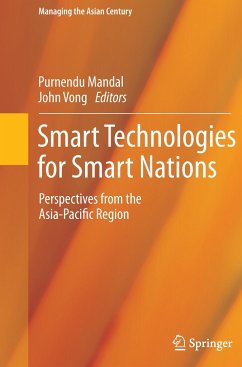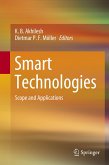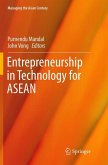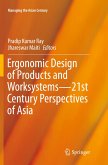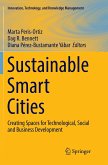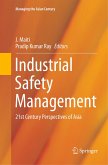Smart Technologies for Smart Nations
Perspectives from the Asia-Pacific Region
Herausgegeben:Mandal, Purnendu; Vong, John
Smart Technologies for Smart Nations
Perspectives from the Asia-Pacific Region
Herausgegeben:Mandal, Purnendu; Vong, John
- Broschiertes Buch
- Merkliste
- Auf die Merkliste
- Bewerten Bewerten
- Teilen
- Produkt teilen
- Produkterinnerung
- Produkterinnerung
This book emphasizes the need for new directions and approaches for social and economic development in the emerging nations of the Asia-Pacific region through the use of Smart Technologies. It takes a holistic view of socio-economic and technical developments taking place through ASEAN and South Asia. Compared to practices in the 20th century, the use of Smart Technologies is likely to have a faster and greater impact on emerging nations (Smart Nations). Smart Technologies for Smart Nations: Perspectives from the Asia-Pacific Region is core reading for academics, professionals, and…mehr
Andere Kunden interessierten sich auch für
![Smart Technologies Smart Technologies]() Smart Technologies121,99 €
Smart Technologies121,99 €![Diversity of Managerial Perspectives from Inside China Diversity of Managerial Perspectives from Inside China]() Diversity of Managerial Perspectives from Inside China41,99 €
Diversity of Managerial Perspectives from Inside China41,99 €![Smart Mirror Technologies in Fashion Business Smart Mirror Technologies in Fashion Business]() Yannick UppenbrinkSmart Mirror Technologies in Fashion Business27,95 €
Yannick UppenbrinkSmart Mirror Technologies in Fashion Business27,95 €![Entrepreneurship in Technology for ASEAN Entrepreneurship in Technology for ASEAN]() Entrepreneurship in Technology for ASEAN81,99 €
Entrepreneurship in Technology for ASEAN81,99 €![Ergonomic Design of Products and Worksystems - 21st Century Perspectives of Asia Ergonomic Design of Products and Worksystems - 21st Century Perspectives of Asia]() Ergonomic Design of Products and Worksystems - 21st Century Perspectives of Asia105,99 €
Ergonomic Design of Products and Worksystems - 21st Century Perspectives of Asia105,99 €![Sustainable Smart Cities Sustainable Smart Cities]() Sustainable Smart Cities121,99 €
Sustainable Smart Cities121,99 €![Industrial Safety Management Industrial Safety Management]() Industrial Safety Management81,99 €
Industrial Safety Management81,99 €-
-
-
This book emphasizes the need for new directions and approaches for social and economic development in the emerging nations of the Asia-Pacific region through the use of Smart Technologies. It takes a holistic view of socio-economic and technical developments taking place through ASEAN and South Asia. Compared to practices in the 20th century, the use of Smart Technologies is likely to have a faster and greater impact on emerging nations (Smart Nations). Smart Technologies for Smart Nations: Perspectives from the Asia-Pacific Region is core reading for academics, professionals, and policymakers interested in technological developments in ASEAN and South Asia.
Produktdetails
- Produktdetails
- Managing the Asian Century
- Verlag: Springer / Springer Nature Singapore / Springer, Berlin
- Artikelnr. des Verlages: 978-981-10-1288-4
- Softcover reprint of the original 1st ed. 2016
- Seitenzahl: 236
- Erscheinungstermin: 23. August 2016
- Englisch
- Abmessung: 235mm x 155mm x 13mm
- Gewicht: 367g
- ISBN-13: 9789811012884
- ISBN-10: 9811012881
- Artikelnr.: 48943845
- Herstellerkennzeichnung Die Herstellerinformationen sind derzeit nicht verfügbar.
- Managing the Asian Century
- Verlag: Springer / Springer Nature Singapore / Springer, Berlin
- Artikelnr. des Verlages: 978-981-10-1288-4
- Softcover reprint of the original 1st ed. 2016
- Seitenzahl: 236
- Erscheinungstermin: 23. August 2016
- Englisch
- Abmessung: 235mm x 155mm x 13mm
- Gewicht: 367g
- ISBN-13: 9789811012884
- ISBN-10: 9811012881
- Artikelnr.: 48943845
- Herstellerkennzeichnung Die Herstellerinformationen sind derzeit nicht verfügbar.
Purnendu Mandal is a Professor at the College of Business, Lamar University, Texas, USA. His teaching and research interests are in the areas of Strategy Management, Technology Development, Supply Chain Management, Strategic MIS and System Dynamics Modelling. He published over 200 journal articles and conference papers. His research papers appeared in journals such as European Journal of Operational Research, International Journal of Production Economics, Management Decision, International Journal of Operations & Production Management, International Journal of Quality & Reliability Management, Logistics Information Management, etc. He serves in the editorial boards of a number of international journals. He is the founder chair of International Conference on Managing the Asian Century and he is the Book Series Editor of `Managing the Asian Century¿ published by Springer. John Vong is Adjunct Professor at the Lee Kuan Yew School of Public Policy, National University of Singapore. Dr. Vong received his PhD in banking and finance systems from the University of Bradford, United Kingdom. He was a former Adviser to the World Bank Group and United Nations Development Programme. His research interest is in digital and technology innovations in financial services, education and health.His recent publications include a book entitled, Emerging Technologies for Emerging Markets (Springer, 2015).
Section 1: Technologies in Service.- Chapter 1: Digital Banking For Alleviating Rural Poverty in Indonesia: Some Evidences.- Chapter 2: Tax Compliance and International Cultural Factors: A Multi-Level Empirical Study.- Chapter 3: Are Values of Managers Associated With The Tasks They Perform? A Trans-National Level Empirical Analysis.- Chapter 4: Indonesian Retail Market Analysis Using Frequent Pattern Data Mining.- Chapter 5: Measurement and Evaluation of Service Productivity: A Holistic Approach.- Chapter 6: Web 2.0 Technologies and Indian IT Services Companies: An Impact Analysis.- Section 2: Technologies in Education.- Chapter 7: The Era of the Global Intern? Business Undergraduates' Perceptions of International Internships at a Foreign University In Vietnam.- Chapter 8: Building and Maintaining Relationships in a Global Education Context.- Chapter 9: Educational Evolution: A Review of MOOCs in Institutes of Higher Education.- Chapter 10: Innovation in a Geographically Distributed Environment: Interrelationship of Organizational Learning and Knowledge Management.- Section 3: Technologies in Improving Work Environment.- Chapter 11: Selection of Alternate Work systems to Improve Occupational Health of Indian Construction Workers: A Design of Experiment Based Approach.- Chapter 12: Hospital Appointment Scheduling in Presence of Walk-ins and Emergency Arrivals.- Chapter 13: Improving Occupational Health of Indian Construction Workers: A Biomechanical Evaluation Approach.- Chapter 14: Cleansing Industrial Pollution: an Eco-friendly Approach.
Section 1: Technologies in Service.- Chapter 1: Digital Banking For Alleviating Rural Poverty in Indonesia: Some Evidences.- Chapter 2: Tax Compliance and International Cultural Factors: A Multi-Level Empirical Study.- Chapter 3: Are Values of Managers Associated With The Tasks They Perform? A Trans-National Level Empirical Analysis.- Chapter 4: Indonesian Retail Market Analysis Using Frequent Pattern Data Mining.- Chapter 5: Measurement and Evaluation of Service Productivity: A Holistic Approach.- Chapter 6: Web 2.0 Technologies and Indian IT Services Companies: An Impact Analysis.- Section 2: Technologies in Education.- Chapter 7: The Era of the Global Intern? Business Undergraduates' Perceptions of International Internships at a Foreign University In Vietnam.- Chapter 8: Building and Maintaining Relationships in a Global Education Context.- Chapter 9: Educational Evolution: A Review of MOOCs in Institutes of Higher Education.- Chapter 10: Innovation in a Geographically Distributed Environment: Interrelationship of Organizational Learning and Knowledge Management.- Section 3: Technologies in Improving Work Environment.- Chapter 11: Selection of Alternate Work systems to Improve Occupational Health of Indian Construction Workers: A Design of Experiment Based Approach.- Chapter 12: Hospital Appointment Scheduling in Presence of Walk-ins and Emergency Arrivals.- Chapter 13: Improving Occupational Health of Indian Construction Workers: A Biomechanical Evaluation Approach.- Chapter 14: Cleansing Industrial Pollution: an Eco-friendly Approach.

